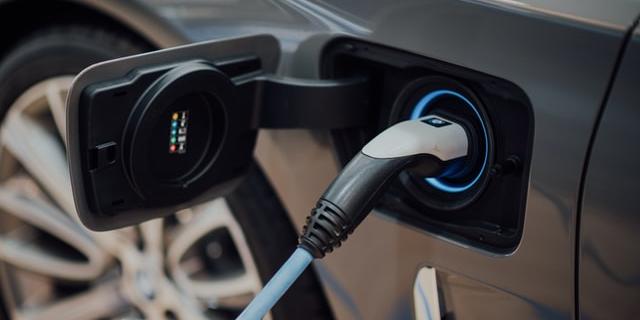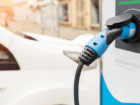With the UK petrol and diesel ban approaching sooner than expected, for many car buyers, electric vehicles (EVs) and plug-in hybrids (PHEVs) are the future. In a bid to get ahead, many car manufacturers are focusing more on the production of EVs to suit the needs of consumers; with ever-improving range and developments in speedy charging.
EVs are new terrain for a lot of us, and many drivers don’t feel confident about going electric, plus there are still many myths in need of clarity. In the hopes of debunking some concerns, here are some common misconceptions around electric cars.

Myth 1: Electric vehicles are slow
Contrary to popular belief, electric vehicles are generally quicker than their petrol and diesel-powered counterparts. The Tesla Model S, for example, is currently one of the quickest production cars in the world – capable of 0-60 mph in just 2.5 seconds.
The reason electric cars are faster than petrol or diesel cars is due to the electric motor which will generate 100% of its available torque instantly. When the driver of an EV pushes down on the accelerator pedal, the transition from stationary to speed is almost instantaneous.
Myth 2: Electric cars can’t drive far without charging
Whilst some electric vehicles of the past have not been known for their range, this is not the case for the majority of current models. Most modern electric cars will have a range upwards of 150 miles – that’s enough to get you from London to Birmingham (give or take) on a single charge.
Thankfully, there are plenty of affordable electric vehicles on the market with a respectable range. The practical and popular Renault Zoe, for example, has a range of 245 miles, but if you have deeper pockets, the Tesla Model 3 has a 310-mile range. Even more impressive is it’s costly sibling, the Tesla Roadster, which claims to operate for a staggering 620 miles per charge.
Myth 3: Charging an electric car takes too long
In the past this may have been the case but the charging time of an electric car has improved massively over the years – and is likely to only get better as new models join the UK market.
The charging time for an EV depends on the charging unit and capacity of the battery. Home chargers, which allow your car to charge on the driveway, typically deliver 7kW. On this basis, most standard EV models are likely to need approximately nine hours to fully charge. However, this can be done easily overnight so it need not interrupt your daily routine.
Speedier 50kW chargers can be found at motorway services, too, if you wish to stop off and charge your EV en-route. In this instance, if you stopped off to plug-in an empty car battery, in most cases, it would be 80% charged in an hour and fifteen minutes – so you may wish to plan your trip accordingly.
Ultra-fast chargers that can deliver 150kW or 300kW are also on the way.
Myth 4: Electric vehicles are too expensive
With the need for sustainability and an eco-friendly drive becoming a bigger selling point for consumers, car manufacturers have taken note and are finding ways to make EVs more accessible and affordable. Thanks to the growing popularity of electric vehicles, the manufacturing cost of batteries is dropping; meaning the price of EVs is expected to decrease even further in the coming years.
The Fiat 500 e, the Peugeot e-208 and the MG EV 5 are all excellent examples of affordable and reliable EVs on the UK market right now. Our sister site, Parkers.co.uk, has a full list of the best cheap electric cars of 2021 here.
Myth 5: Electric vehicles run out of charge with no warning
This is false. Much like a petrol or diesel car, electric vehicles give you plenty of warning before running out of charge. To avoid running out of charge, there are three basic ways to charge an electric car: at home via a home charger, at work, or at a public charging point. Most EVs can be left to charge overnight, or you can charge for a few hours when stopping off on your journey.
Myth 6: EVs are too expensive to charge and maintain
The cost of charging and maintaining an EV is often a cause for debate. However, research from Parkers.co.uk in 2020 revealed that the average cost of charging an EV for a 100-mile range was approximately £4 – £6, compared to £13 – 16 for that of a petrol/diesel car.
In terms of maintaining your electric vehicle, an added benefit of EVs is that they do not require regular oil changes or tune-ups so it’s likely that you would save money on routine maintenance. Unlike petrol and diesel cars, there are also fewer moving parts that are likely to need replacing.
Myth 7: EV batteries will end up in landfill
It is true that the car industry is still working towards methods that will make electric car batteries more sustainable. That said, the batteries that power electric cars currently can be recycled; particularly in the case of the older-technology lead-acid batteries whereby 96% of the materials in the battery can be recovered, and the remaining elements broken down for repurposing elsewhere (source).
Furthermore, in some countries, electric vehicles are federally mandated to carry separate warranties for battery packs for at least eight years or 100,000 miles (whichever comes first). According to research, the Nissan Leaf retained 75% of their battery capacity after 120,000 miles on the road. A Tesla, on the other hand, is said to have 90% of battery life intact after 200,000 miles.








